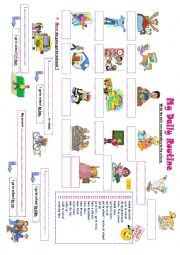
|
Daily routine pictionary
I�m re-uploading this worksheet. It�s a matching exercise to learn daily routine vocabulary. Some means of transportation included so that students can say how they go to school.
Hope the pictures are ok this time!
Level: elementary
Age: 8-17
Type: worksheet
Downloads: 272
|
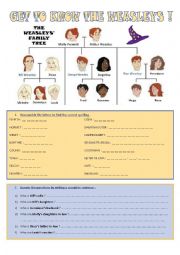
|
Get to know the Weasleys!
Four different exercises about family links : a spelling exercise, learning how to read a family tree, making sentences using the genitive case, revising possessive adjectives et personal pronouns. Hope you�ll like it !
If you�re interested, I did a corresponding online exercise (same name).
Level: elementary
Age: 10-17
Type: worksheet
Downloads: 191
|
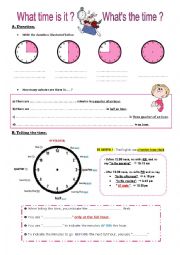
|
Have you got the time ?
A three-page worsheet I used with my year 7 when teaching them how to tell the time. The first part is about duration and saying how many minutes there are in a quarter of an hour, half an hour, etc.. I used the second and third activity after oral practice, as a written trace. Finally, there are 2 exercises on the last page ( telling the time + wo...
Level: elementary
Age: 8-17
Type: worksheet
Downloads: 116
|
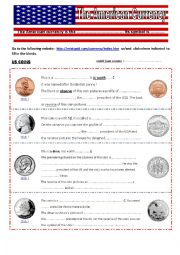
|
The American currency
Here is a simple webquest to get familar with American coins and bills; their value and the presidents pictured on them.
Level: intermediate
Age: 12-17
Type: worksheet
Downloads: 65
|
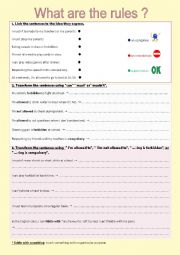
|
What are the rules ?
I use this worksheet with my year 7. It contains 3 different exercises. In the first one, pupils have to link sentences to the idea they express. In the second and third exercise they have to practise using the modals can, must and mustn�t or their equivalents, be allowed to, be forbidden or be compulsory.
Hope you�ll find it useful !
Level: elementary
Age: 10-17
Type: worksheet
Downloads: 16
|
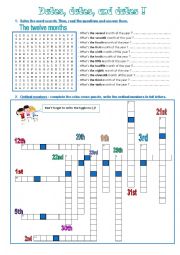
|
What�s the date ?
A series of activities to revise the twelve months of the year, ordinal and cardinal numbers, and how to say the date. I used this worksheet after pupils practised saying when they were born. Hope you�ll find it useful.
Level: elementary
Age: 11-17
Type: worksheet
Downloads: 141
|
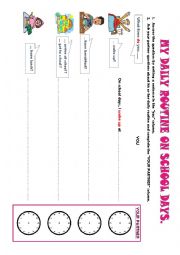
|
What�s your typical day like ?
This is a pair-work activity to practise talking about every day life. Students should first answer questions about their routine before asking a partner what time they do sth. Then, they should report their partner�s answers to the class ( practising speaking in the third person singular)and finally they should complete a paragraph with verbs in t...
Level: elementary
Age: 9-17
Type: worksheet
Downloads: 43
|
|
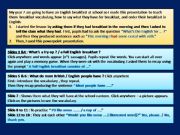
What�s a full English breakfast ?
A ppt to teach pupils what a full English breakfast consists of, what British people really have for breakfast nowadays and finally to teach them how to say what they�d like for breakfast. You�ll find "instructions" on the first slide. Hope you�ll find it useful.
Level: elementary
Age: 11-17
Downloads: 36
|
|

Bob, the couch potato
Two exercises to practise using "too much" "too many" " very little" "very few" and "not ...enough".
One exercice to practise giving advice with should or shouldn�t
Level: intermediate
Age: 11-100
|

both / neither ..nor / either ..or
a short exercise to practise writing sentences with "both ..and" "neither ..nor" "either..or".
Level: intermediate
Age: 12-100
|

Classroom Language
2 exercises to practise making polite requests and asking permission in class.
Level: elementary
Age: 9-100
|
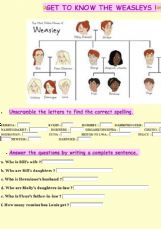
Get to know the Weasleys
A simple game to review how to talk about family links in English. It contains a double puzzle where pupils have to find the correct spelling of words in relation to family. Then, pupils have to do 3 different exercises : a reading comprehension, writing sentences using the genitive case and writing...
Level: elementary
Age: 10-100
|

Have they been somewhere or gone somewhere ?
Two easy exercises to practise "have been " or "have gone" + short explanations
Level: elementary
Age: 12-100
|
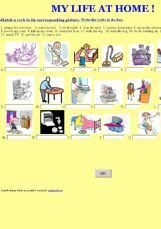
My life at home
A very simple activity. First the kids have to match a verb to a picture and then they must complete some sentences with can, must or mustn�t. Most of the vocabulary is about chores at home.
Level: elementary
Age: 8-100
|
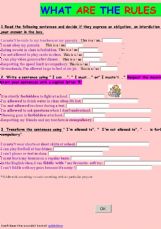
What are the rules ?
This is the online exercise corresponding to the worksheet "What are the rules?"
3 different exercises to practise writing sentences with the modals "can" "must" "mustn�t" and their equivalents " (not)be allowed to" " be compulsory" and "be forbidden".
Enjoy !
Level: elementary
Age: 11-100
|
|